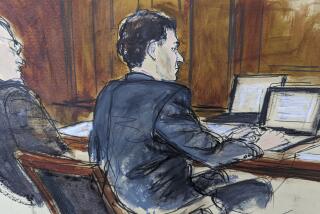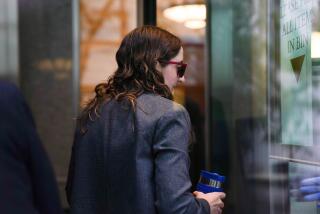Attorneys Say Witness’ Claims Unbelievable
- Share via
LITTLE ROCK, Ark. — Neal T. Ainley, the Whitewater prosecution witness who claims that he violated federal banking laws at the urging of Bruce Lindsey, President Clinton’s trusted aide, was accused Friday by defense attorneys of concocting the story to avoid a jail sentence.
Ainley, 38, a former bank president, acknowledged under cross-examination that he told a substantially different story when FBI agents first approached him about two years ago. He also admitted that he did not begin cooperating with the Whitewater investigation headed by independent counsel Kenneth W. Starr until after being charged with five felonies.
Starr reduced the charges against Ainley to two misdemeanors in exchange for his cooperation--including testimony in the current trial of Herby Branscum Jr. and Robert M. Hill, owners of the Perry County Bank where Ainley worked. Ainley was then sentenced to probation, community service and a $1,000 fine.
Based on Ainley’s testimony, Branscum and Hill have been accused by the government of illegally reimbursing themselves from bank funds for campaign contributions to Clinton and other Democrats--and of conspiring with Ainley to conceal $52,500 of cash withdrawals from the bank by Clinton’s 1990 gubernatorial campaign.
Ainley also has testified that he failed to report the withdrawals to the Internal Revenue Service, as required by law, at the urging of Lindsey, who was campaign treasurer. Lindsey has strongly denied the allegation.
Under cross-examination, Ainley admitted he was initially equivocal about Lindsey’s role. He said he first told investigators that he was “probably” acting on the advice of Lindsey when he destroyed a report intended to go to the IRS.
Following Friday’s court testimony, Alan Snyder, Lindsey’s attorney, told reporters that Ainley’s credibility had been destroyed by the intense questioning of lawyers for Branscum and Hill.
“The cross-examination demonstrated the total lack of credibility of the prosecution’s star witness,” Snyder said. “Anybody sitting in that courtroom who heard Mr. Ainley’s false, evasive and creative responses realizes how little it was worth.”
Ainley admitted that he did not tell the prosecution about the allegedly improper campaign contributions until nearly a year after he was first questioned by the FBI in the summer of 1994. Nor did he fully admit when he was initially interrogated that he had concealed two Clinton campaign cash withdrawals, he said.
Defense attorneys Dan Guthrie and Jack Lassiter said Ainley has told several of his friends and relatives over the past two years that he embellished on the truth in his statements to the government to avoid a jail sentence.
Guthrie quoted Ainley as telling others: “When the big man gets you, you do or say anything to save yourself. . . . When these SOBs get ahold of you, you’ll tell them anything they want to hear.”
Ainley denied ever making any such statement. He said he decided to cooperate with Starr simply because he wanted to “keep from being tagged a felon.”
But Ainley did not deny that he also had had a falling out with Branscum and Hill shortly before he was approached by government investigators. The disagreement caused him to resign from the bank in March 1994. He was first contacted by the FBI that June.
More to Read
Get the L.A. Times Politics newsletter
Deeply reported insights into legislation, politics and policy from Sacramento, Washington and beyond. In your inbox twice per week.
You may occasionally receive promotional content from the Los Angeles Times.









